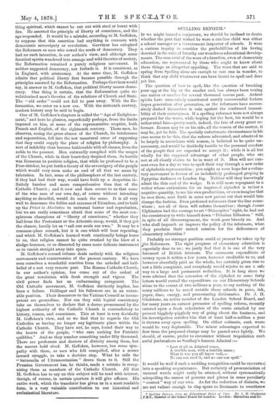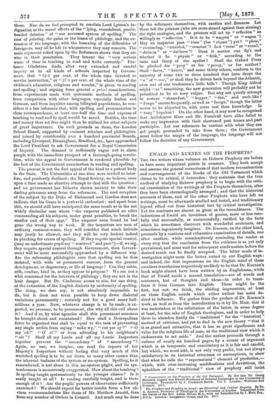SPELLING REFORM.''
lir we might hazard a conjecture, we should be inclined to doubt whether the poet that wished he were a careless child was either a school manager or a Government inspector of schools. It were a curious inquiry to consider the probabilities of his having descried in the vista of futurity our wondrous educational develop- ments. The sum total of the woes of education, even of elementary education, are represented by those who ought to know about
these things as altogether appalling. The woes that are said to spring from Spelling alone are enough to cast one in wonder, to think that any child whatsoever can have learnt to spell and does yet live.
The question of how to spell, like the question of breaking your egg at the big or the smaller end, has always been vexing one nation or another for several thousand moons past. Ardent spirits have successively constituted mostly unsuccessful forlorn hopes generation after generation, as the reformers have succes- sively dashed themselves in vain against the confirmed insensi- bility of their countrymen. If a spelling reformer were not always prepared for the worst, while hoping for the best, his would be a rather cruel fate—pretty much, indeed, the fate of every great re- former. Reason may be on his side, all the reason of the matter, it may be, yet he fails. The specially unfortunate circumstance in his case seems to be this, that the reform advocated, and admitted to be largely in accordance with reason, is believed to be quite un- necessary, and would be decidedly hostile to the personal comfort of the people that are expected to accept it ; while it is all but wholly for the supposed advantage of other people, who are not at all clearly shown to be in want of it. Men will not con- sent even for a day or two to spell their way through a new order of alphabetic representation ; you might as soon hope for a volun-
tary movement in favour of an indefinitely prolonged groping in Egyptian darkness or London fog. Neither will they knowingly
admit the thin end of the wedge. It is still more repugnant to a writer whose enthusiasm for an improved alphabet is rather a negative quantity, to see his own productions, or even imagine that he sees them, sent forth in some new patent cut that would fain change the fashion. Even professed reformers draw the line some- where ; not all of them will reform themselves ; though James Elphinston had the courage to set "Dzhoopiter" right, he had not the consistency to write himself down " Dzhaimz Elfinston." Still, in spite of all discouragement, the work goes bravely on. And who shall impeach or improve the policy of the reformers, when they proclaim their sacred mission for the deliverance of elementary education ?
Probably no stronger position could at present be taken up by .the Reformers. The right progress of elementary education is especially dear to us ; we justly feel that it is one of the very foremost of British interests. The enormous expenditure of money upon it within a few years, however creditable to us, and however cheerfully paid on the whole, has certainly given rise to not a little complaint, and everybody would rejoice to see a safe way to a large and permanent reduction. It is long since we were advised that the extension of the alphabet to some forty letters would curtail the expenditure on our. Elementary Schools
alone to the extent of two millions a year, to say nothing of the many millions to be saved outside these schools in pens, ink,
paper, time, energy, and pronouncing dictionaries. Dr. J. H. Gladstone, an active member of the London School Board, and for many years an earnest promoter of spelling reform, recently entered upon a fresh calculation of the waste entailed by our present higgledy-piggledy way of going about the business, and his investigation satisfies him that at least half-a-million a year is thrown away upon spelling. On either estimate, such waste would be very deplorable. The minor advantages expected to flow from the proposed change may be passed over lightly. We should, of course, prefer to encounter without trepidation such awful jawbreakers as Southey's famous Admiral :—
" Last of all an Admiral came, A terrible man, with a terrible name ; What it was you all know well,—
No one can read it, and no one can spell."
It would be well if such a nodding recognition could be converted into a speaking acquaintance. But certainty of pronunciation of unusual words might easily be attained, without systematically misspelling the names of persons and places in some peculiarly " correct " way of our own. As for the reduction of dialects, we are not valiant enough to clap spurs to Rosinante to overthrow
* Spelling Reform. from an Educational Point of View. By J. H. Gladstone F.B.S., Member of the School Board for London. London : Macmillan and Co. these. Nor do we feel prompted to emulate Lord Lytton's in- dignation at the moral effects of the "lying, roundabout, puzzle. headed delusion" of "our accursed system of spelling." The cost of printing, the gains or the losses of philology, and the,ex- tension of the language, with the lessening of the difficulties of foreigners, may all be left to whomsoever they may concern. The main argument relied upon by the Reformers shows that they are wise in their generation. They lament the "very serious waste of time in teaching to read and write correctly." Pro- fessor Gladstone finds, after very extended and careful inquiry as to all kinds of schools inspected by Govern- ment, that "32-2 per cent. of the whole time devoted to secular instruction," or "27'3 per cent, of the whole time of the children's education, religious and secular," is given to reading and spelling ; and arguing from general a priori considerations, from experiments made with systematic methods of spelling, from comparison with other languages, especially Italian and German, and from inquiries among bilingual populations, he con- siders it a fair inference that, with spelling and pronunciation in close correspondence, at least one-half the time and expense of teaching to read and to spell would be saved. Besides, the time and money thus set free might then be utilised for other subjects of great importance. On such grounds as these, the London School Board, supported by eminent scholars and philologists, and joined by considerably over a hundred provincial Boards, including Liverpool, Birmingham, Bradford, &c., have approached the Lord President to ask Government for a Royal Commission of Inquiry. The demand is sufficiently vague not to alarm people with the immediate prospect of a thorough-going revolu- tion, while the appeal to Government is rendered plausible by the fact of the Government examination in reading and spelling.
The present is not the first appeal of the kind to a potent body in the State. The Universities at one time were invited to inter- fere, and prudently declined ; the Royal Society, we believe, once upon a time made an abortive attempt to deal with the question ; and no government has hitherto shown anxiety to take their darling grievance away from the reformers. The cool reception of the subject by the Duke of Richmond and Gordon does not indicate that his Grace is a perfervid enthusiast ; and apart from this, we should still have anticipated the same result as in the not widely dissimilar case where "the emperor published an edict commanding all his subjects, under great penalties, to break the smaller end of their eggs." The emperor soon found he had gone the wrong way to work. If the inspectors are men of ordinary common-sense, they will consider that much latitude may justly be allowed, and they will be very lenient indeed in plucking for errors of spelling. If they require special control, (may an unfortunate pupil say " controul "and pass ?)—if, we say, they require special control through Government, then Govern- ment will be more successfully approached by a different way. Are the reforming philologists sure that spelling can be thus isolated, with wide or permanent success, from the general development, or degeneracy, or life of language ? Can they cabin, crib, confine, bind in, as they appear to propose? We are not a whit concerned for the interests of philology ; they are not in the least danger. But Dr. Gladstone seems to aim, for one thing, at the extinction of the English dialects by uniformity of spelling. The thing, we dare say, is not absolutely impossible to do, but it does not seem possible to keep down dialectal variations permanently ; certainly not for a good many half- millions a year. Now, whatever change is to be made, is ex- pected, we presume, to be permanent, else why all this coil about it? And if so, by what agencies shall this permanent sameness be brought about and maintained? How shall a Metropolitan force be organised that shall be equal to the task of preventing any single urchin from saying "mike wy," " vot yer zy ?" "0 ray 'ed !" "0' ri'!" or from adverting to his neighbour's oiz "2 Shall all my Lords and all my Lords' Inspectors together prevent the " ascendency " of " ascendancy " ? Again, no one, we imagine, can read the reports of her Majesty's Inspectors without feeling that very much of this wretched spelling is to be set down to many other causes than the inherent badness of the system or no-system. Spelling, be it remembered, is not alone in this no-system plight, and its sys- temlessness is monstrously exaggerated. How about the teaching ? Is spelling taught systematically to the younger classes ? Is it really taught at all ? Is reading carefully taught, and is there -enough of it ? Are the pupils' powers of observation sufficiently exercised ? We should expect far better results from a few ob- vious recommendations like those of Mr. Matthew Arnold, than from any number of Orders in Council. And much may be done by the reformers themselves, with caution and firmness. Let them tell the printers (who are more sinned against than sinning) the right analogies, and the printers will set up " reflexion " as willingly as "reflection." Is it to be " waggon " or "wagon"? May an inspector pass " rime " (for "rhyme ") yet? "plow," "counseling," " traveled," " cruelest "? Is it " reca/ " or "recall," " dulness " or " dullness "? Does it matter one fig's end whether it be " physic " or " fizik," according to the taste and fancy of the speller? Shall the Oxford Press be plucked for " peny " or for "penny," or for neither? Shall "favor," "honor," and some thirty others, conform to the majority of some two or three hundred that have dropt the "u " of "-our," or shall they be driven back beyond the Atlantic, even out of our tradesmen's little bills ? Though King Alfred might "ax" something, the new generation will probably not be permitted to be so very vulgar. But why not quietly attempt to restore " shamefast," " begger," " tho," and such-like? " Forgo " occurs frequently, as well as "forego," though the latter seems to be objected to, with more zeal than knowledge. Is " tung " hopeless ? On the other hand, it may now be recognised that Archdeacon Hare and Mr. Furnivall have alike failed to make any impression with their shortened past tenses and past participles. Let our reformers be content with what they can get people persuaded to take from them ; the Government must follow the usages of the language, the language will not follow the dictation of any Government.



































 Previous page
Previous page